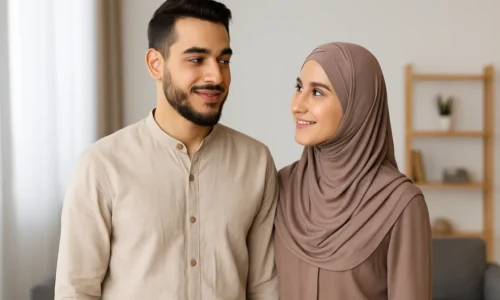Marriage is a sacred bond in Islam, and choosing a life partner is one of the most important decisions. Many Muslims asking about the permissibility of marrying non-Muslims, such as Hindus, Christians, or those of other faiths.
In this blog post, we’ll answer this quastion can a muslim marry a non muslim with Islamic law. And what the Quran and Hadith say about marrying non-Muslims. Understanding these guidelines allows Muslims to make correct decisions about their relationships and ensure that their marriages are consistent with their faith.
Can A Muslim Marry A Non Muslim
Choosing a spouse is a big decision for a Muslim. The Quran guides Muslims to marry people who share their faith. This creates a strong base for a happy family life. It also helps to raise children with Islamic values.
The Quran says, “Do not marry polytheistic women until they believe…” (Quran 2:221). This verse tells Muslims to marry other believers. The goal is to keep the Islamic faith strong in the family. It also ensures that children grow up following Islamic teachings.
The Prophet Muhammad (peace be upon him) also emphasized marrying someone with the same faith. He said, “A woman is married for four things: her wealth, her family, her beauty, and her religion. So marry the one with the best religion and character, and you will do well” (Sahih Al-Bukhari).
Islam allows Muslim men to marry Jewish or Christian women in some cases. But it is better for Muslims to marry within their faith. This helps maintain a strong Islamic identity. It also makes it easier to practice Islam together and raise children with Islamic values.
Can a Muslim marry a Christian
Yes, a Muslim man can marry a Christian woman, as Christians are considered “People of the Book” (Ahl al-Kitab) in Islam. The Quran states:
“This day all good things have been made lawful for you. The food of the People of the Book is lawful for you, and your food is lawful for them. And lawful for you in marriage are chaste women from the believers and chaste women from those who were given the Scripture before you.” (Quran 5:5)
This verse clearly allows Muslim men to marry women from the People of the Book, which includes Christians and Jews.
However, while it is permissible, scholars generally advise Muslims to marry within their faith in order to maintain a strong Islamic foundation in the family and avoid potential conflicts caused by differing religious practices.
Will Allah Forgive Me For Marrying A Non Muslim
Marrying a non-Muslim who is not from the People of the Book (e.g., Hindus, Buddhists, atheists) is not permissible in Islam. If a Muslim man has married such a woman, the marriage is not considered valid under Islamic law, and the intimate relationship would be considered zina (fornication).
But Allah is Most Merciful and Forgiving. If a person sincerely repents, seeks forgiveness, and resolves to follow the teachings of Islam, Allah can forgive any sin. The Quran states:
“Say, ‘O My servants who have transgressed against themselves [by sinning], do not despair of the mercy of Allah. Indeed, Allah forgives all sins. Indeed, it is He who is the Forgiving, the Merciful.’” (Quran 39:53)
The Prophet Muhammad (peace be upon him) also said, “Allah, Blessed is He and Most High, said: ‘O son of Adam, as long as you call upon Me and put your hope in Me, I have forgiven you for what you have done and I do not mind…” (Tirmidhi)
Can A Muslim Marry A Hindu
No, a Muslim cannot marry a Hindu according to Islamic teachings. The Quran allows Muslims to marry chaste believing women and women from the People of the Book (Christians and Jews) (Quran 5:5). Hindus are not considered People of the Book, so marrying a Hindu is not permissible and would be considered zina (fornication). However, sincere repentance and seeking Allah’s forgiveness can lead to mercy and forgiveness.
Punishment For Marrying A Non Muslim
The punishment for a Muslim marrying a non-Muslim varies depending on the specific circumstances and the country’s laws. In some Islamic countries, it may be considered a crime punishable by law. However, the primary consequence is that the marriage is considered invalid and void under Islamic law.
If a Muslim man marries a non-Muslim woman who is not from the People of the Book (Christians or Jews), the marriage is not recognized as legitimate in Islam. The intimate relationship between the couple would be considered zina (fornication), which is a major sin in Islam.
Similarly, if a Muslim woman marries a non-Muslim man, the marriage is also considered invalid, and the couple would be committing zina.
In the afterlife, Muslims believe that those who engage in zina and do not sincerely repent may face punishment in hellfire. However, it is essential to note that the doors of repentance are always open, and Allah is Most Merciful and Forgiving to those who sincerely seek His forgiveness and mend their ways.
The focus in Islam is on sincere repentance, seeking forgiveness, and striving to follow the right path, rather than on worldly punishments. Muslims are encouraged to adhere to Islamic teachings regarding marriage to maintain the purity and sanctity of the family unit.
Can A Muslim Marry A Non Hijabi?
Yes, a Muslim man can marry a non-Hijabi woman. The Quran and Hadith do not make wearing hijab a requirement for marriage. What matters most is a person’s faith, character, and desire to follow Islamic teachings.
The Quran tells both men and women to be modest: “And tell the believing women to reduce their vision and guard their private parts and not expose their adornment…” (Quran 24:31). This verse encourages modesty but does not say women must wear hijab to marry.
The Prophet Muhammad (ﷺ) said: “A woman may be married for four reasons: her wealth, her status, her beauty, and her religion. So marry the one who is religious, may your hands be rubbed with dust” (Sahih Bukhari). This shows that a spouse’s faith and character matter more than outer appearances.
If a Muslim man wants to marry a non-Hijabi woman, they should respect each other and share a goal to grow in faith together. In a loving marriage, spouses can support each other in living Islamic values, like modesty, with patience and kindness.
Can A Muslim Marry Another Woman Without Permission?
No, a Muslim man is not required to obtain permission from his first wife if he wishes to marry a second wife. There is no clear evidence in the Quran or the Sunnah that makes the first wife’s consent a prerequisite for a second marriage.
The Quran states: “…marry women of your choice, two or three or four; but if you fear that you shall not be able to deal justly (with them), then only one…” (Quran 4:3). This verse allows polygyny without mentioning the need for the first wife’s permission.
However, it is essential to note that the verse emphasizes the importance of treating all wives fairly and equally. The Prophet Muhammad (ﷺ) also warned against favoritism, saying, “Whoever has two wives and he inclines towards one of them (in treatment), he will come on the Day of Resurrection with one of his sides leaning” (Sunan Abu Dawud).
While not a requirement, it is highly recommended for a husband to discuss his intention to marry another woman with his current wife or wives. This fosters open communication, trust, and respect within the marriage. A husband should also ensure that he can fulfill his responsibilities towards all his wives and children equally.
In short, a Muslim man can marry a second wife without his first wife’s permission, but he should still talk to her about it and make sure he treats all his wives fairly, as the Quran and Prophet Muhammad have taught.
Do You Have To Convert To Islam To Have A Nikkah?
Yes, to have a valid nikkah (Islamic marriage), the person must be a Muslim. In Islam, marriage is a sacred contract between a Muslim man and a Muslim woman. If a non-Muslim wants to marry a Muslim, they must first convert to Islam.
The Quran says: “Do not marry idolatresses until they believe; a believing slave woman is better than an idolatress, even if she pleases you. Do not give your women in marriage to idolaters until they believe; a believing slave is better than an idolater, even if he pleases you.” (Quran 2:221)
This verse clearly states that Muslims should not marry non-believers (idolaters). It emphasizes the importance of faith in a marriage and that a believing partner, even if they are a slave, is better than a non-believer.
When a non-Muslim converts to Islam, they must say the Shahada (declaration of faith): “I bear witness that there is no deity worthy of worship except Allah, and I bear witness that Muhammad is His servant and messenger.” This statement marks a person’s entry into Islam.
After conversion, the person is considered a Muslim and can proceed with the nikkah. The nikkah ceremony typically involves the presence of witnesses, a marriage contract, and a mahr (dowry) given by the groom to the bride.
Can You Get Married Without A Nikkah?
From an Islamic perspective, a couple cannot be considered married without a nikkah. The nikkah is the official Islamic marriage ceremony that legalizes the union between a man and a woman. Without a valid nikkah, any intimate relationship between the couple would be considered haram (forbidden) and sinful.
The Prophet Muhammad (peace be upon him) said, “There is no marriage except with a guardian and two reliable witnesses.” (Sunan Ibn Majah)
This hadith highlights the importance of having a proper nikkah ceremony with the presence of the bride’s guardian (usually her father or a close male relative) and two witnesses. These elements are essential for a marriage to be considered valid in Islam.
During the nikkah, the bride and groom express their consent to marry each other, and the marriage contract (aqd-nikah) is signed. The mahr (dowry) is also specified and agreed upon during this ceremony.
In some countries, a civil marriage registration may also be required in addition to the nikkah for the marriage to be legally recognized. However, from a religious standpoint, the nikkah remains the most crucial aspect of an Islamic marriage.
Can Muslims Kiss Before Marriage?
No, Muslims are not allowed to kiss before marriage. In Islam, any intimate physical contact between unmarried individuals is considered haram (forbidden). This includes kissing, hugging, and any other form of sexual activity.
The Quran states: “And do not approach unlawful sexual intercourse. Indeed, it is ever an immorality and is evil as a way.” (Quran 17:32)
This verse prohibits Muslims from engaging in any sexual activity outside of marriage, including acts that may lead to it, such as kissing or intimate touching.
The Prophet Muhammad (peace be upon him) also emphasized the importance of maintaining chastity before marriage. He said, “Whoever can guarantee (the chastity of) what is between his two jaw-bones (i.e., his mouth) and what is between his two legs (i.e., his private parts), I guarantee Paradise for him.” (Sahih al-Bukhari)
In Islam, the purpose of avoiding physical intimacy before marriage is to preserve chastity, maintain purity, and prevent emotional and physical attachment that may lead to unlawful relationships.
During the period before marriage, Muslims are encouraged to focus on getting to know their potential spouse through respectful communication and interaction in the presence of family members or in public settings.
Is It Haram To Have A Girlfriend?
Yes, in Islam, it is considered haram (forbidden) to have a girlfriend or a romantic relationship outside of marriage. Islam prohibits any form of premarital intimate relationship between men and women who are not married to each other.
The Quran says: “And do not approach unlawful sexual intercourse. Indeed, it is ever an immorality and is evil as a way.” (Quran 17:32)
This verse clearly instructs Muslims to stay away from any sexual activity outside of marriage, which includes having a girlfriend or boyfriend.
The Prophet Muhammad (peace be upon him) also emphasized the importance of avoiding relationships outside of marriage. He said, “Whenever a man is alone with a woman, the Devil makes a third.” (Sahih al-Bukhari)
This hadith suggests that being alone with a member of the opposite sex can lead to temptation and sin, which is why Islam discourages such interactions outside of marriage.
In Islam, the only permissible relationship between a man and a woman is through marriage. The purpose of this rule is to protect the chastity and purity of individuals and to prevent emotional and physical exploitation.
Instead of having a girlfriend, Muslims are encouraged to focus on their personal and spiritual growth, education, and career. When ready for marriage, they should seek a suitable partner through lawful means, such as family introductions or matchmaking services.
Is It Ok If I Don’t Marry In Islam?
In Islam, marriage is highly recommended and encouraged, but it is not considered an obligation or compulsory for every individual. While there are many benefits to getting married, such as companionship, emotional support, and fulfilling sexual desires in a lawful manner, it is not a sin if a person chooses not to marry.
The Quran says: “And marry the unmarried among you and the righteous among your male slaves and female slaves. If they should be poor, Allah will enrich them from His bounty, and Allah is all-Encompassing and Knowing.” (Quran 24:32)
This verse encourages marriage but does not make it mandatory. It also highlights that Allah will provide for those who marry, even if they are poor.
The Prophet Muhammad (peace be upon him) said, “O young men, whoever among you can afford it, let him get married, for it is more effective in lowering the gaze and guarding chastity. And whoever cannot afford it should fast, for it will be a shield for him.” (Sahih al-Bukhari)
This hadith suggests that if a person is able to marry and support a family, they should do so as it helps protect them from falling into sin. However, if a person cannot afford to get married, fasting is recommended as an alternative means of controlling desires.
There can be various reasons why someone may choose not to marry, such as focusing on their education, career, or spiritual growth, or not finding a suitable partner. As long as a person maintains their chastity and avoids engaging in unlawful relationships, not marrying is not considered sinful.
However, it is essential to note that if a person fears falling into sin or has strong sexual desires that they cannot control, it is better for them to marry to protect their chastity and avoid committing haram (forbidden) acts.
Can A Girl Kiss A Girl In Islam?
No, in Islam, it is not permissible for a girl to kiss another girl in a romantic or sexual way. Islam prohibits same-sex romantic or sexual relationships, considering them to be sinful and going against the natural order created by Allah.
The Quran states: “And (remember) Lut (Lot), when he said to his people: ‘Do you commit the worst sin such as none preceding you has committed in the ‘Alamin (mankind and jinns)?’” (Quran 7:80)
This verse refers to the story of Prophet Lut (Lot) and his people, who engaged in homosexual acts, which Islam considers a major sin.
The Prophet Muhammad (peace be upon him) also said, “If a man comes upon a man, then they are both adulterers, and if a woman comes upon a woman, then they are both adulteresses.” (Al-Tabarani)
This hadith clearly states that same-sex sexual relations are considered a form of adultery and are thus prohibited in Islam.
Islam views sexual relations as only permissible within a marriage between a man and a woman. Any sexual activity outside this context, whether heterosexual or homosexual, is considered haram (forbidden).
It is important to note that while Islam prohibits same-sex sexual acts, it does not condone hatred, violence, or discrimination against individuals based on their sexual orientation. Muslims are expected to treat all people with kindness, respect, and compassion, even if they disagree with their lifestyle choices.
Is It Halal To Hug Your Girlfriend?
No, it is not halal (permissible) in Islam to hug your girlfriend. Physical intimacy, including hugging, kissing, and sexual contact, is only allowed between a married couple. Islam prohibits any form of romantic or sexual relationship outside of marriage. Engaging in such acts with a girlfriend is considered zina (fornication), which is a major sin in Islam. Muslims are encouraged to maintain respectful and appropriate boundaries with the opposite gender to preserve chastity and avoid temptation.
Is It Haram To Stay Single Forever?
No, it is not haram (forbidden) to stay single forever in Islam. While marriage is highly encouraged and recommended, it is not considered an obligation. The Quran states, “And whoever among you cannot [find] the means to marry free, believing women, then [he may marry] from those whom your right hands possess of believing slave girls.” (Quran 4:25) This verse suggests that if someone cannot afford to marry or find a suitable spouse, they are not sinful for remaining unmarried. However, staying single should not be an excuse to engage in unlawful relationships or activities. Muslims who choose to remain single must still maintain their chastity and adhere to Islamic guidelines regarding interactions with the opposite gender.
Is Lip Kiss Haram?
In Islam, married couples are allowed to kiss on the lips. It’s a good way for them to show love. But if you’re not married, lip kissing is not allowed in Islam. It’s important to stay pure before marriage. Kissing and other physical stuff can lead to wrong desires and is seen as going against Islamic rules if you’re not married.










